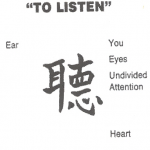More often than not, human beings forget about this very important tool called empathetic listening and prefer to “win” at the cost of their relationship. How often do you practice empathetic listening?
The urge to win the argument is very familiar to many couples but is not an effective conflict strategy. Tell me if this scenario is familiar to you or someone you know.
Partner #1 “You’re always working. You don’t spend enough time at home with the kids”. Partner #2 “Nothing is ever good enough for you,” “I’m always working because you’re always spending so much money.”
Partner 1. “At least I’m at home with the family, not married to my job. I might as well be single. In fact, I am.” Partner #2 “Yeah, but I’m not a critical bit… who’s bankrupting the family.”
The biggest source of conflict for couples isn’t money, sex, fidelity, child rearing, or in-laws. It’s the urge to win. Wanting to win, to be right makes us feel strong, safe and gratified. It’s also disastrous for a relationship. When the goal is winning instead of understanding, partners are more likely to ignore, or step on each other’s feelings. This leads to resentment and hostility and then to alienation. Remember, the urge to win the argument is not an effective conflict strategy. Why do human beings continue to focus on defeating their partners rather than on hearing or understanding them? 1. Some people believe if they get the first punch, they believe they can avoid being humiliated or bullied.  Others think that crushing their mate is the only course of action available to them—they’re afraid that unless they’re overpowering, they’ll be overpowered and won’t be heard at all. They think the only available choices are conqueror or doormat- and many do not want to be a doormat. Winning makes some people temporarily feel triumphant and safe. But, as we all know, going for the win is the course of action least likely to get them what they really want.
Others think that crushing their mate is the only course of action available to them—they’re afraid that unless they’re overpowering, they’ll be overpowered and won’t be heard at all. They think the only available choices are conqueror or doormat- and many do not want to be a doormat. Winning makes some people temporarily feel triumphant and safe. But, as we all know, going for the win is the course of action least likely to get them what they really want.
You know you’re getting stuck in this dead-end strategy when being right is more important to you than improving the relationship, or when you constantly question or deny your partner’s feelings and perceptions: One of you begins a sentence with “I feel…” and the other says, “No, you don’t” or “You shouldn’t.” You know you’re stuck when your conversations sound more like angry debates than open and honest collaborations, when you regularly interrupt each other, or when, instead of listening, you mentally rehearse what you’re going to say while your mate is speaking.
The way to break the cycle is by using an important conflict strategy, empathetic listening.
Empathic listening is defined as: a way of listening and responding to another person that improves mutual understanding and trust. If couples followed this one tip, it would save them a lot of time, money, and tears. Be more interested in understanding your spouse than in winning.
By empathetic listening, you are hearing what your partner is really saying and feeling, instead of bracing for what you think he is going to say. In empathetic listening you might not always agree with your partner but you still strive to understand his/her logic and emotions. When each of you is committed to understanding the other’s point of view, you begin to create an atmosphere of safety and trust that encourages working together to solve your problems.
Author Stephan Covey says “When you really listen to someone until they are understood, you are communicating their worth & potential- you are affirming them. They don’t want to fight you and they become more open”. It will actually save you time if actually fully listen to your partner. Try it out today! Click the video below to see Stephan Covey’s video on Empathetic listening.

